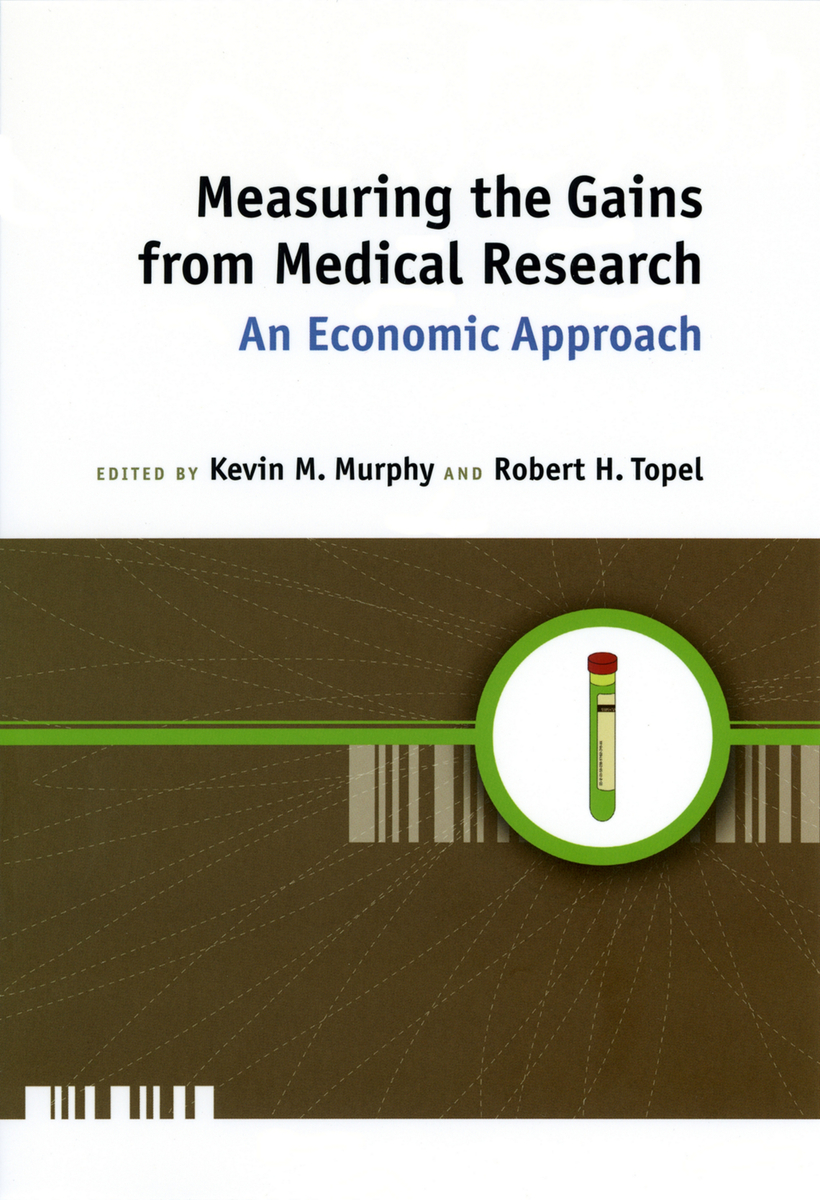Measuring the Gains from Medical Research
An Economic Approach
University of Chicago Press, 2003
Cloth: 978-0-226-55178-4 | Electronic: 978-0-226-55179-1
DOI: 10.7208/chicago/9780226551791.001.0001
Cloth: 978-0-226-55178-4 | Electronic: 978-0-226-55179-1
DOI: 10.7208/chicago/9780226551791.001.0001
AVAILABLE FROM
University of Chicago Press (ebook)Apple Books
Barnes & Noble Nook
Chegg Inc
DeGruyter Multi-User Ebook Program
ebrary
EBSCO eBooks (formerly NetLibrary)
Google Play
OverDrive
University Press Scholarship Online (UPSO)
ABOUT THIS BOOKAUTHOR BIOGRAPHYTABLE OF CONTENTS
ABOUT THIS BOOK
In 1998, health expenditures in the United States accounted for 12.9% of national income-the highest share of income devoted to health in the developed world. The United States also spends more on medical research than any other country-in 2000, the federal government dedicated $18.4 billion to it, compared with only $3.7 billion for the entire European Union. In this book, leading health economists ask whether we are getting our money's worth.
From an economic perspective, they find, the answer is a resounding "yes": in fact, considering the extraordinary value of improvements to health, we may even be spending too little on medical research. The evidence these papers present and the conclusions they reach are both surprising and convincing: that growth in longevity since 1950 has been as valuable as growth in all other forms of consumption combined; that medical advances producing 10% reductions in mortality from cancer and heart disease alone would add roughly $10 trillion-a year's GDP-to the national wealth; or that the average new drug approved by the FDA yields benefits worth many times its cost of development.
The papers in this book are packed with these and many other surprising revelations, their sophisticated analysis persuasively demonstrating the massive economic benefits we can gain from investments in medical research. For anyone concerned about the cost and the value of such research-from policy makers to health care professionals and economists-this will be a landmark book.
From an economic perspective, they find, the answer is a resounding "yes": in fact, considering the extraordinary value of improvements to health, we may even be spending too little on medical research. The evidence these papers present and the conclusions they reach are both surprising and convincing: that growth in longevity since 1950 has been as valuable as growth in all other forms of consumption combined; that medical advances producing 10% reductions in mortality from cancer and heart disease alone would add roughly $10 trillion-a year's GDP-to the national wealth; or that the average new drug approved by the FDA yields benefits worth many times its cost of development.
The papers in this book are packed with these and many other surprising revelations, their sophisticated analysis persuasively demonstrating the massive economic benefits we can gain from investments in medical research. For anyone concerned about the cost and the value of such research-from policy makers to health care professionals and economists-this will be a landmark book.
AUTHOR BIOGRAPHY
Kevin M. Murphy is the George J. Stigler Professor of Economics in the Graduate School of Business and the Department of Economics at the University of Chicago. He is coauthor of Social Economics: Market Behavior in a Social Environment.
Robert H. Topel is the Isidore Brown and Gladys J. Brown Professor in Urban and Labor Economics in the Graduate School of Business at the University of Chicago. He is coeditor of The Welfare State in Transition and Labor Market Data and Measurement, both published by the University of Chicago Press.
Robert H. Topel is the Isidore Brown and Gladys J. Brown Professor in Urban and Labor Economics in the Graduate School of Business at the University of Chicago. He is coeditor of The Welfare State in Transition and Labor Market Data and Measurement, both published by the University of Chicago Press.
TABLE OF CONTENTS
Introduction - Kevin M. Murphy, Robert H. Topel
The Health of Nations: The Contribution of Improved Health to Living Standards - William D. Nordhaus
The Economic Value of Medical Research - Kevin M. Murphy, Robert H. Topel
Pharmaceutical Innovation, Mortality Reduction, and Economic Growth - Frank R. Lichtenberg
The Return to Biomedical Research: Treatment and Behavioral Effects - David M. Cutler, Srikanth Kadiyala
Biomedical Research and Then Some: The Causes of Technological Change in Heart Attack Treatment - Paul Heidenreich, Mark McClellan
Can Medical Cost-Effectiveness Analysis Identify the Value of Research? - David Meltzer
Contributors
Author Index
Subject Index
